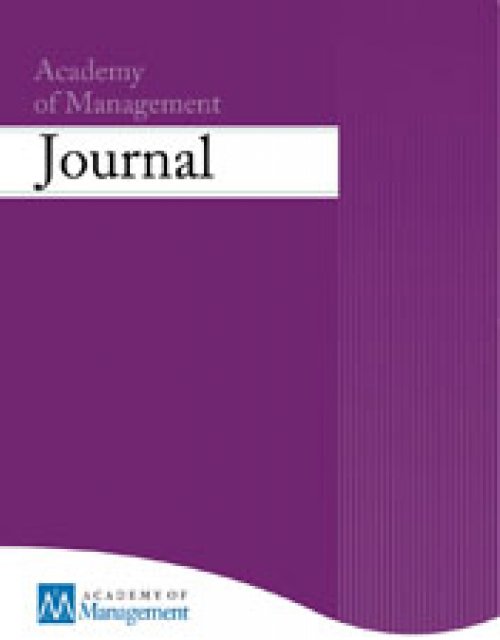Publication records
Subject(s)
Strategy and general management; Technology, R&D management
Keyword(s)
Crowdsourcing, innovation, tie formation, networks, rejection
When organizations crowdsource ideas, they ultimately select only a small share of the submitted ideas for implementation. Organizations generally provide no feedback on ideas they do not select. Contributors whose ideas are not selected for implementation tend to forego submitting ideas in the future. We suggest that organizations can increase contributors’ willingness to submit ideas in the future by giving a thus far understudied form of feedback: rejections. Drawing on social network theory, we develop the overarching argument that rejections lead contributors to bond with the organization, increasing their willingness to continue to interact with the organization. While it may be counterintuitive to associate rejections with bonding, we hypothesize that rejections indicate to contributors that the organization is interested both in receiving their ideas and in developing a relationship with them. This effect, we argue, is particularly pronounced when rejections provide newcomers with explanations that suggest to them that they and the organization are a good match. To test our theory, we examine the crowdsourcing efforts of 70, 159 organizations that receive ideas from 1,336,154 contributors. Using large-scale content analysis, we examine differences in how rejections are written in order to disentangle the mechanisms through which rejections affect contributors’ willingness to continue to interact with an organization. We find that getting a rejection has a positive effect on a newcomer’s willingness to submit idea in the future. The effect is stronger if the rejection includes an explanation, and is particularly pronounced if the explanation accompanying the rejection matches the original idea in terms of linguistic style.
With permission of the Academy of Management
Volume
62
Journal Pages
503-530
Subject(s)
Economics, politics and business environment; Entrepreneurship
Keyword(s)
Energy sector, recommunalization, management of utilities, infrastructure policies, infrastructure services, regulatory models
The paper discusses economic perspectives on recommunalization in the energy sector. When privatization and deregulation of public infrastructure services became the dominant paradigm of public policy in the 1980s and 1990s, it was considered an adequate measure to increase efficiency, enable consumer choice, and foster a cultural change towards more competitive practices among the management of utilities. In retrospect, the move towards market principles and privatization in infrastructure policies has not yielded regulatory convergence towards a liberalized system architecture. On the contrary, it can be observed that in some infrastructure sectors liberalization has succeeded as the dominant design, whereas other infrastructure services have by and large remained in public ownership and under strict government control (Observation #1). An analysis of the electricity sector shows that a broad spectrum of diverse regulatory models co-exists – across world regions, countries, and even individual states, such as in the USA (Observation #2). The recent wave of recommunalizations may be interpreted as a backlash to free-market principles in infrastructure services. In bottom-up initiatives, citizens intend to reclaim (at least partial) control of public infrastructure services. These initiatives operate in a larger context of private individuals and associations entering the electricity sector in a new form of dispersed private ownership (Observation #3). In the future all the diverse models might co-exist while digitalization will provide transparency for the actors involved.
Pages
5
Subject(s)
Entrepreneurship; Human resources management/organizational behavior; Technology, R&D management
Keyword(s)
Entrepreneurship, human capital
Subject(s)
Product and operations management
Keyword(s)
Health care, contracting, fine balance matching, service value chain
Maintenance service plans (MSPs) are contracts for the provision of maintenance by a service provider to an equipment operator. These plans can have different payment structures and risk allocations, which induce various types of incentives for agents in the service chain. How do such structures affect service performance and service chain value? We provide an empirical answer to this question by using a unique panel data covering the sales and service records of more than 700 diagnostic body scanners. We exploit the presence of a standard warranty period and employ a matching approach to isolate the incentive effects of MSPs from the confounding effects of endogenous contract selection. We find that moving the equipment operator from a basic, pay-per-service plan to a fixed-fee, full-protection plan not only reduces reliability but also increases equipment service costs. Furthermore, that increase is driven by both the operator and the service provider. Our results indicate that incentive effects arising from MSPs leads to losses in service chain value, and we provide the first evidence that a basic pay-per-service plan—under which risk of equipment failure is borne by the operator—can improve performance and reduce costs.
Copyright © 2019, INFORMS
Volume
65
Journal Pages
955–1453
Subject(s)
Human resources management/organizational behavior
Keyword(s)
Feedback, Dark Triad, leadership
Secondary Title
Fair talk: Three steps to powerful feedback
Pages
138–139
ISBN
978-1-912555-09-3
Subject(s)
Economics, politics and business environment; Finance, accounting and corporate governance
Keyword(s)
Financial integration, single market, European integration, free movement of capital
JEL Code(s)
F21, F33, F36, G21, G28
It is 25 years since the European Union (EU) agreed to complete the European Single Market (SM) in goods, services, people, and capital. While many barriers to the free movement of capital across borders have been removed, some important practical hurdles are still in place. The euro crisis has shown that the European financial sector in particular remains vulnerable and fragmented and this poses serious risks to the stability of both national economies and the euro area as a whole. In 2015, the European Commission therefore set out a list of measures to establish an integrated capital market in the EU by 2019.
The first part of this policy paper analyzes the channels through which financial integration affects growth, stability, and convergence in the EU, including capital allocation, production specialization, diversification of risk, and access to investment opportunities. The second part takes stock of persisting administrative and legal hurdles that impede full market integration. In particular, this paper distinguishes between a firm-level perspective, investors, and banks in its analysis. The final part provides some specific recommendations to improve the internal market for capital in the EU.
The first part of this policy paper analyzes the channels through which financial integration affects growth, stability, and convergence in the EU, including capital allocation, production specialization, diversification of risk, and access to investment opportunities. The second part takes stock of persisting administrative and legal hurdles that impede full market integration. In particular, this paper distinguishes between a firm-level perspective, investors, and banks in its analysis. The final part provides some specific recommendations to improve the internal market for capital in the EU.
Journal Pages
24
ISSN (Print)
1866–4016
Subject(s)
Economics, politics and business environment; Strategy and general management; Technology, R&D management
Keyword(s)
Peer-to-peer trading, business model, blockchain technology, transactive energy, regional energy markets, platforms, decentral energy generation
Secondary Title
Consumer, prosumer, prosumager: How service innovations will disrupt the utility business model
Edition
1st ed.,
Pages
27–52
ISBN
978-0-12-816835-6
ISBN (Online)
978-0-12-816836-3
Subject(s)
Human resources management/organizational behavior
Keyword(s)
Leadership development, Russia, Russian HR practices
This chapter summarizes the need to transfer leadership development in Russian organizations from the hands of HR to senior executives and boards.
Secondary Title
The life of Russian business: (Re)cognizing, (re)activating and (re)configuring institutions
Pages
283–285
ISBN
9781641134514
ISBN (Online)
9781641134521
Subject(s)
Economics, politics and business environment; Management sciences, decision sciences and quantitative methods
Keyword(s)
Risk preferences, development, prospect theory
Volume
86
Journal Pages
1–21
Subject(s)
Human resources management/organizational behavior
Keyword(s)
Accuracy, social projection, cultural values, collectivistic vs. individualistic value
Volume
49
Journal Pages
47–62
ISSN (Online)
1099-0992

